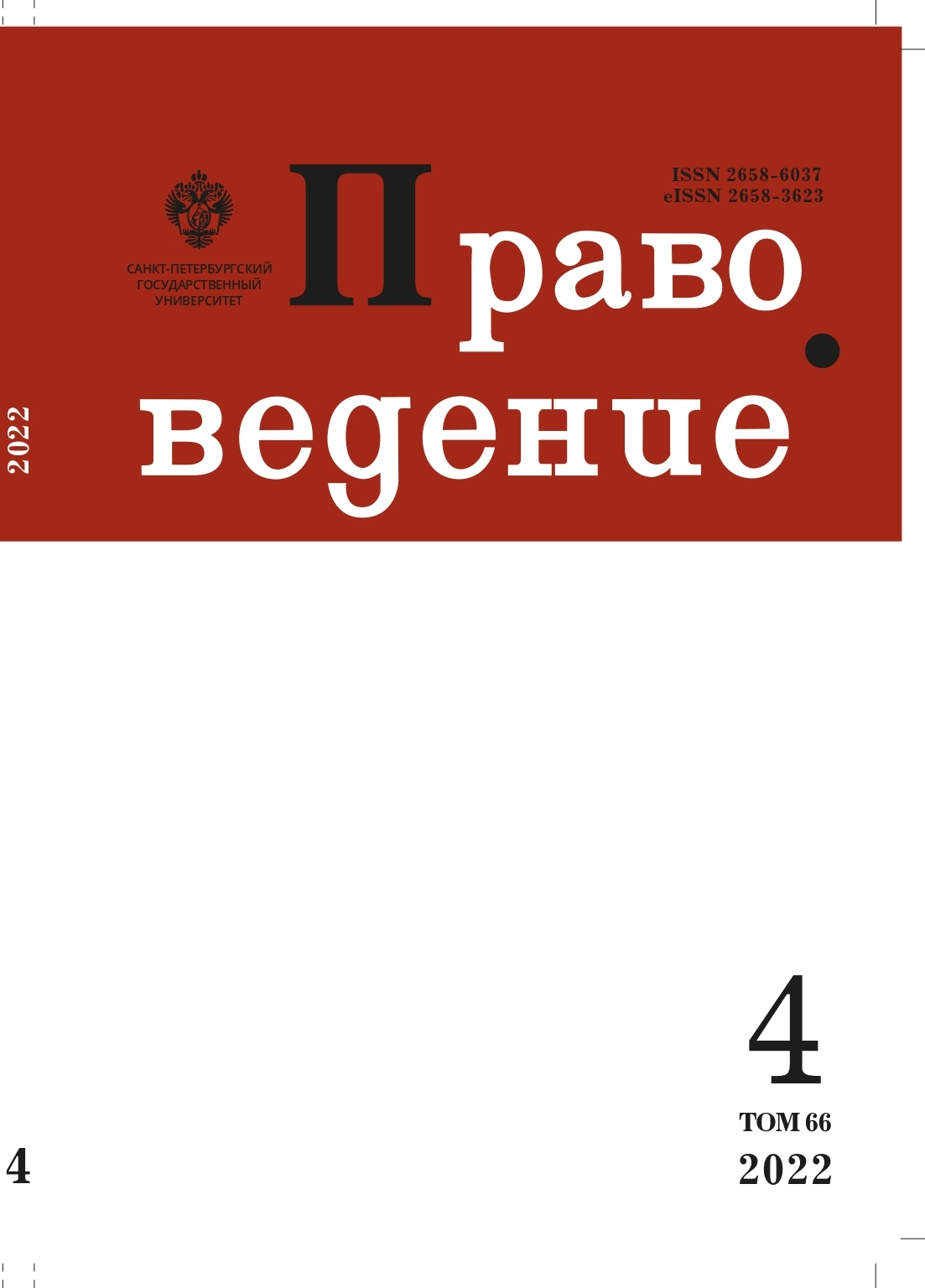Key historically developed layers of German AGB law
DOI:
https://doi.org/10.21638/spbu25.2022.405Abstract
The article is an attempt to outline the so called “AGB-Recht” of Germany in an unconventional way, and years of contemplation have left the author to think that this part of German law is nothing but an aggregation of historically developed layers which sustained their sway due to their practical significance, however do not constitute a coherent body of principles that causes numerous conflicts between adopted approaches, notwithstanding the fact that it is a minutely elaborated legal institute. The author commences analysis with general overview of norms and case law that influenced its development and turns to examination of each layer insofar as its influence is traceable in the law or in court practice. The author has to admit lacking coherency in a number of cases. Among others: no definite transition to abstract fairness of clauses control and underestimation of objective interpretation in this regard, disregard of the fact that the contract with standard terms consists of both individual and non-individual (superindividual) elements, hesitative attempts to bases solutions on prevention. Also, the institute reveals inefficiency when, on the one hand, stimulation of the parties using standard terms not to abuse their power to determine them is not effective, and on the other hand, fairness of clauses control accompanied by inadmissibility for the courts to restate clauses leaves them in total uncertainty as to which clauses could be used and making them to search for correct formula, sometimes for years. At the same time, protection of their counterparties is substantially diminished when clauses control leads only to exclusion of unfair clauses but practically lacks tools to supply the counterparty with additional rights when necessary. Since interpretative gap-filling barely solves this problem, the issue remains within the ambit of legislature that may imperatively supply the contracts with necessary additional rights and securities. The article delivers critical analysis of the institute and does not serve the audience as the source of all necessary references to case law and legal scholarship.
Keywords:
contract of adhesion, unfair contract terms, fairness of clauses control, good faith, interpretative gap-filling, private law prevention
Downloads
References
Agarkov, Mikhail M. 2004. The concept of transaction in Soviet civil law. Selected works on civil law: 333–360. Moscow, JSC Center IurInfoR Publ. (In Russian)
Canaris, Claus-Wilhelm. 2006. Handelsrecht. 24. Aufl. München, C. H. Beck.
Coester-Waltjen, Dagmar. 1990. Die Inhaltskontrolle von Verträgen außerhalb des AGBG. Archiv für civilistische Praxis 190: 1–33.
Conod, Philippe, Bohnet, Franҫois. 2014. Droit du bail: Fond et procédure. Bâle (Basel), Helbing Lichtenhahn.
Emmerich, Volker. 1972. Die Problematik der Allgemeinen Geschäftsbedingungen. Juristische Schulung: 361–369.
Flume, Werner. 1962. Das Rechtsgeschäft und das rechtlich relevante Verhalten. Archiv für civilistische Praxis 161: 52–76.
Flume, Werner. 1992. Allgemeiner Teil des bürgerlichen Rechts. Bd. II. Das Rechtsgeschäft. 4. Aufl. Berlin, Heildelberg, New York, London, Springer.
Galin, Konstantin A., Zhuzhzhalov, Mikhail B. 2016. Uniform contractual clauses interpretation rules in Germany. Svoboda dogovora, ed. by M. A. Rozhkova: 246–352. Moscow, Statut Publ. (In Russian)
von Grossmann-Doerth, Hans. 1933. Selbstgeschaffenes Recht der Wirtschaft und staatliches Recht. Freiburg in Breisgau: Wegner Verlag.
Grüneberg, Christian. 2021. Kommentare zu §§ 276, 305с. Palandt. Bürgerliches Gesetzbuch. 80. Aufl. München, C. H. Beck.
Hager, Johannes. 1996. Der lange Abschied vom Verbot der geltungserhaltenden Reduktion. Juristen Zeitung 51(4): 175–179.
Heinrichs, Helmut. 1995. Das Transparenzgebot und die EG-Richtlinie über mißbräuchliche Klauseln in Verbraucherverträgen. Lebengides Recht — Von den Sumerern bis zur Gegenwart. Festschrift für Reinhold Trinkner zum 65. Geburtstag: 157–177. Heidelberg, Verlag Recht und Wirtschaft GmbH.
Helm, Johann Georg. 1965. Private Norm und staatliches Recht beim Massenvertrag. Juristische Schulung: 121–129.
Kaufhold, Sylvia. 2014. AGB-Anschein trotz Verhandlungsbestätigung — Ist der Individualvertrag noch zu retten? Neue Juristische Wochenschrift: 3488–3492.
Krampe, Christof. 1994. Aufrechterhaltung von Verträgen und Vertragsklauseln — Eine Bestandsaufnahme zur neueren Rechtsprechung und Literatur. Archiv für civilistische Praxis 194: 1–41.
Larenz, Karl. 1970. Schuldrecht. Bd. I. Allgemeiner Teil. 10. Aufl. München, C. H. Beck.
Leenen, Detlef. 2011. BGB Allgemeiner Teil: Rechtsgeschäftslehre. Berlin, New York, De Gruyter.
Raiser, Ludwig. 1961. Das Recht der allgemeinen Geschäftsbedingungen. Bad Homburg vor der Hohe, Hermann Gentner Verlag.
Reinhardt, Rudolf. 1957. Die Vereinigung subjektiver und objektiver Gestaltungskräfte im Vertrage. Festschrift zum 70. Geburtstag von Walter Schmidt-Rimpler: 115–138. Karlsruhe, Verlag C. F. Müller.
Roth, Herbert. 2015. Kommentar zu § 139. Staudingers Kommentar zum Bürgerlichen Gesetzbuch. Allgemeiner Teil 4b: § 139–157. Berlin, Sellier — de Gruyter.
Roth, Herbert. 1989. Geltungserhaltenden Reduktion im Privatrecht. JuristenZeitung 44(9): 411–419.
Sicchiero, Gianluca. 2006. La clausula contractual. Anuario de derecho civil 59(4): 1642–1657.
Schlosser, Peter. 2014. Kommentare zu § 305c, Rn. 108. Staudingers J. von. Kommentar zum Bürgerlichen Gesetzbuch. Sonderedition: AGB-Recht. Berlin, Sellier — de Gruyter.
Schmidt, Harry. 2016. Kommentare zu § 306. Ulmer/Brandner/Hensen. AGB-Recht. 12. Aufl. Köln, Verlag Dr. Otto Schmidt KG.
Schmidt-Rimpler, Walter. 1941. Grundfragen einer Erneuerung des Vertragsrechts. Archiv für civilistische Praxis 147: 130–197.
Schmidt-Salzer, Joachim. 1995. Recht der AGB und der missbräuchlichen Klauseln: Grundfragen. Juristen Zeitung 50(5): 223–231.
Schmidt-Salzer, Joachim. 1966. Das Recht der Allegemeinen Geschäfts- und Versicherungsbedingungen. Berlin, Dunckers & Humblot.
Stoffels, Markus. 2015. AGB-Recht. 3. Aufl. München, C. H. Beck.
Thalmair, Peter. 1999. Vom Postulat der Überraschungsfreiheit von AGB-Klauseln zu ihrer Transparenzkontrolle. Inaug.-Diss. München.
Uffmann, Katharina. 2010. Das Verbot der geltungserhaltenden Reduktion. Tübingen, Mohr Siebeck.
Wieling, Hans J. 2020. Venire contra factum proprium und Verschulden gegen sich selbst. Vestnik ekonomicheskogo pravosudiia Rossiiskoi Federatsii 5: 20–40. (In Russian)
Downloads
Published
How to Cite
Issue
Section
License
Articles of "Pravovedenie" are open access distributed under the terms of the License Agreement with Saint Petersburg State University, which permits to the authors unrestricted distribution and self-archiving free of charge.




